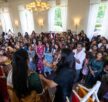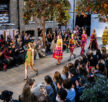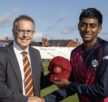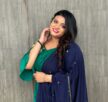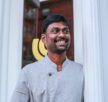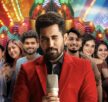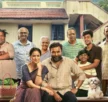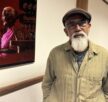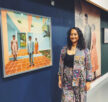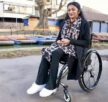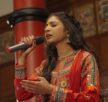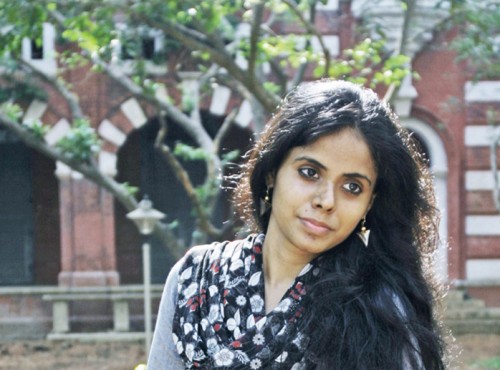

Ms. Militancy: Meena Kandasamy
- 4th March 2011
- POST IN :SOCIETY
Meena Kandasamy is a poet, writer, translator and social activist hailing from Tamil Nadu, India. She focuses her writing mainly on feminism and the annihilation of the caste system, but tackles other social and political issues also. Her candid words on such topics have attracted both praise and criticism.
Meena has translated into English the works of several Tamils including Eelam Tamil poet Kasi Anandan and Dalit leader Thol. Thirumavalavan. With a PhD in sociolinguistics, she is currently based at Kent University as a Charles Wallace India Trust Fellow. Her first collection of poems (“Touch”) was published in 2006 and at the end of 2010, her second collection – “Ms. Militancy” – was released.
Kavya from Thamarai.com caught up with Meena to find out more.
Thank you so much for taking time to talk to me, Meena. Let’s first talk about your latest book “Ms. Militancy”. You’ve taken Hindu myths and retold them in poetry form from a feminist perspective. How did you come up with the concept?
It was a host of factors that made me conceive and come up with Ms Militancy. First of course was poetic influence—the way Anne Sexton retold the Grimm Brothers’ Fairytales in her book of poems, Transformations, how Carol Ann Duffy tells the female side of the heroes story in The World’s Wife. I knew that this kind of feminist, revisionist retelling had tremendous revolutionary potential, and therefore I decided to do it with Tamil and Hindu mythology. Before I saw Transformations, I never had the idea of coming with such a thematic collection.
I was writing a poem on Nalayini called Six Hours of Chastity, re-imagining what she must have done with her time when her husband was busy with his favourite prostitute. It was liberating to make her subversive, liberating to let her make her choices. Then it sort of grew, I was looking at many of the female mythological characters and decided that they could all be empowering if only their stories were retold, if only we didn’t accept that there as a standard (patriarchal) set story. Then, this book was born.
The preface of the book reads “My Kali kills. My Draupadi strips. My Sita climbs on a stranger’s lap.”. These don’t seem like positive attributes for a woman to have. What point are you trying to make here?
Just for a little context: The next line goes: “All my women militate. They brave bombs, they belittle kings. They take on the sun, they take after me.” That is how I imagine the women to be; combative, aggressive, militant, brave and ready to challenge all kinds of oppression.
The point I am making is that what is dished out as “positive attributes for a woman” are stereotypes that seek to enslave us and condition us into accepting male hegemony and patriarchy. The second thing I am trying to do is emphasize the fact that women are autonomous, that we are not merely taking orders from men. Sita is often portrayed as the obedient Hindu wife, but I find it inspiring that she is one of the first women who dares to step across the line, strike up a conversation with a stranger. All our myths lend to multiple readings, and my task, as a poet and as a feminist, is to offer some of these alternative possible readings.
Such readings are necessary, as what is handed down to us is a sterilized patriarchy-approved story that tells us that Andal and Akka Mahadevi and Mira are nothing but bhakti poets! One look at their lines, the deep eroticism, the direct address to a male lover, all of this is erased and wiped away for the sake of a spiritual project. That is why a project like Ms Militancy becomes essential because it lays claim to religious space, it seeks a share of story-telling, it breaks the shackles of convention.
Obviously, religion is a very sensitive subject to tackle. How have staunch Hindus reacted to your work?
They called me all kinds of names, which I anticipated. Then there was hate mail and fake profiles on twitter and trolls and abuse. Then there were veiled threats—some of them said, “you wouldn’t be alive today if you had attacked other religions.” I am happy that I elicit such extreme emotions in people: they either hate me, or they love me. At the end of the day you realize that your art is genuine if it can provoke such strong reactions.
Do you find that other factors – such as the fact that you’re a FEMALE who is so outspoken or your openness to taboo topics such as sex – attract negative comments too?
The fact that women should not speak up, or speak out is a cultural construct that is so well-entrenched that we are still fighting it in the 21st century. Men could get away saying the exact things that I said, they would merely be called rationalists, or progressive, or enlightened!
Let’s go back a few years – where did this fighting spirit of yours come from?
I have never had a verbal spat with anyone in a very long time, I am hugely non-confrontational as an individual, and if I ever get into a fight, I am the first one to apologize, to go make peace. At the same time, all my work and all my writing reads like part of one long fight. I got the raw courage to fight from reading the works of Dr.Ambedkar and Periyar and Malcolm X and every radical feminist who walked this earth, yet in everyday life, I think it is my mother who inspired me. She is a fighter. It is easy to be an island, easy to fight as a writer/individual, but she keeps fighting when she is part of a system. I’ve never seen her give up, I’ve never seen her put up with bullshit. She showed me what it was to speak out in the face of harassment. Her struggle at the IIT Madras, seeking implementation of affirmative action policies for Dalits and other backward communities is about two decades long, and she has been individually penalized for it, but she hasn’t given up. And the best thing that I love about her work is that she doesn’t really talk much about it, she doesn’t think she is doing a favour for others, she doesn’t mind approaching anyone for a helping hand. She is someone who gives the impression that standing up for your rights is the most natural thing to do.
When did you start writing? Who are your favourite writers, and who/what inspires you?
I started writing in 2001, but I never took myself seriously until my first book was out. My favorite list of writers should be another interview altogether. If you ask me to name just one writer, I would say Arundhati Roy. I salute her courage and I am a great fan of her writing.
For Hindus and Indians living abroad, the caste system has become almost obsolete, so it’s easy to forget that it is still a part of society in India. How much have attitudes towards the caste system changed in India over the years?
I disagree with the first part of the sentence: that the caste system is obsolete among Diaspora Indians. The caste system might not be a criteria for socializing, and it might not be a part of their day-to-day identity since they are faced with other monsters to fight, but exists. I’ve heard stories about this from my friends in the US, from my friends in South Africa, and of course, my friends in the UK. Of course, it is nowhere as virulent as it is in India, and that is perhaps its only saving grace!
While the educated people might not “rationalize” the existence of the caste system, they have not stepped out of it. One still has caste-based associations, and caste-based politics, the caste-based Indian arranged marriage, and even the caste-based Indian love marriage. It is not that I seek to sensationalize the issue of caste, but one of the pointers.
How do non-Indians react to your work when compared to Indians? Do you notice a difference?
Yes there is, and it is essentially because not all non-Indians are aware of the context. For instance a few of my poems deal with the genocide of Tamils in Sri Lanka, and most people in the world have no clue where the island even exists, so one has to launch into a history lesson instead of actually performing the poems. It is the same with the caste system because then there are so many, many questions and I am too happy to comment and clarify. I am thankful to get the platform, to make this alternative voice heard. Poetry opens up space for discussion and debate in an amazing manner, there’s no doubt about it.
But it can also become tiring in a way because you are immediately slotted as this militant Dalit activist, feminist poet with sympathy for the Tamil Tigers. This sort of denominational pigeon-holing happens in India too.
At school you studied Hindi and English, yet today you have translated the works of several Tamil writers into English. Where did you learn Tamil?
Tamil was always there: parents, friends, society. I learnt to read the language by looking at newspaper headlines, posters, suchlike. My father taught Tamil at the University of Madras, so he was impressed by my interest. So, when I was thirteen or so, Appa made me learn the Thirukkural—that was the first Tamil text that I read. We would sit in the garden and he would read it aloud and point out all the words there, explaining the meaning for every individual one, making me marvel at the number of words we had lost in all these intervening years. Then I read other Tamil texts, progressing quite greedily to claim my language as my own. I will be doing my second PhD soon, and it is going to be on Tamil literature.
Looking at your previous collection of poems – “Touch” – it is clear that you put a lot of thought not only into the words, but also into the way they are laid out on the page. For example, in the poem “Liquid Tragedy: Karamchedu 1985”, the words form the shape of a pot. Do you think that poetry is as much a visual art as it is a literary one?
Poetry has enormous scope to be visual but the danger is that people would immediately put it down as experimental. Poetry trying to be something else is subversive, and yet, one has to keep pushing the boundaries, one has to hang on to the margins.
Your website mentions that you’re working on a novel “The Gypsy Goddess”. What can you tell us about this book? Do you prefer writing poetry over fiction?
It is a historical fiction set in Tamil Nadu and I’m afraid that’s all I can say at the moment. I am not writing a novel because it is fashionable to write one, or because fiction sells more, has a larger audience, makes one a celebrity and so on. The story that I am working on is a story that has to be told and I have lived with it for more than three years now, and finally got down to working on it seriously. I am a poet, a free spirit and I find that fiction calls for quite some discipline, especially the discipline to sit at your desk and write. You can write poetry in your mind for days and then write it down when it pleases you and look at it five months later and make a rewrite, and a week later combine this poem with another set of notes, and then spend two sleepless nights putting it together like a control freak, and lo and behold, you have a poem. If you tried that with fiction, you would be kicked.
You’re currently a Fellow at the School of English at the University of Kent. What are you working on here and how are you finding it?
When I’m not working on my novel, I am out exploring the University’s hangouts, cooking food for my flatmates, attending readings by other poets, and most of the time ranting about the desolate weather and the howling winds! I am not a touristy person, I haven’t even visited the Canterbury Cathedral yet, it is a shame! I promise myself that I will go there once I am done with the writing!
You’ve chosen writing as your means of sharing your views on various social and political issues. Do you believe that the pen is mightier than the sword?
I cannot give you an honest opinion because I have never carried a Kalashnikov, never caressed a hand-grenade. Writing can fight prejudice, writing can change perspectives, writing can bring about a revolution. I have no doubts about this. And yet, I know that people sometimes are forced to bear arms because writing alone cannot save their lives!
Meena’s latest book “Ms. Militancy” can be purchased here. Her other works can be viewed on her blog. Meena Kandasamy can be contacted via her website, her Facebook page or her Twitter account.
Interview by Kavya Rajagopalan © Thamarai.com 2011
- Previous Post
Unity Through Sports




